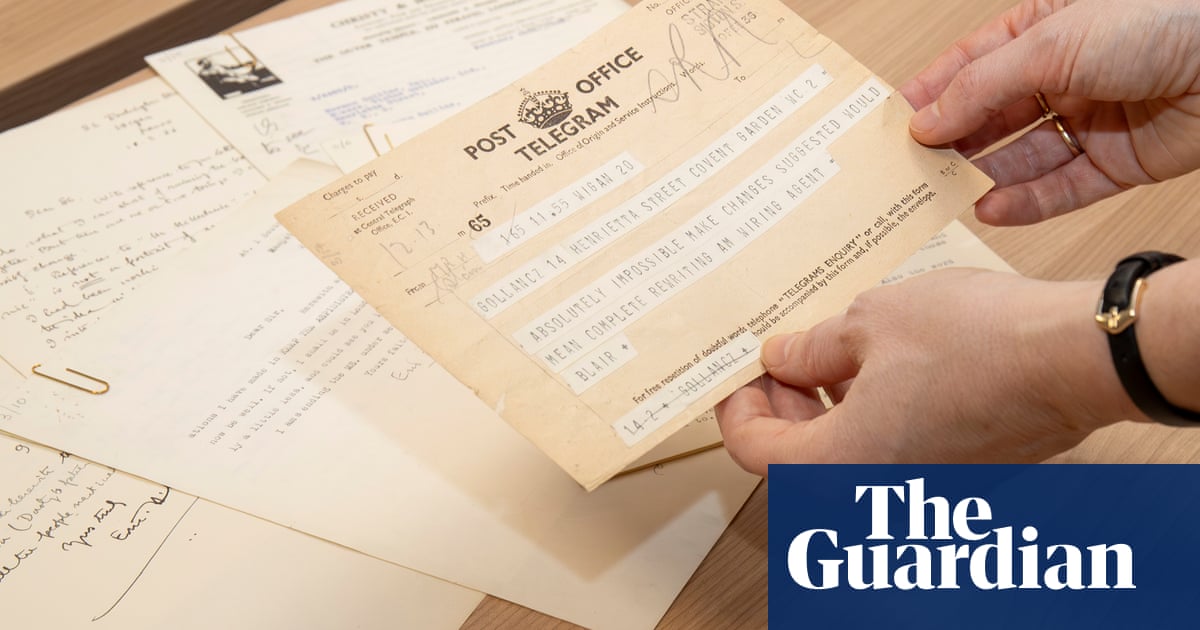George Orwell’s correspondence, contracts and readers’ reports relating to his earliest novels are among historic papers that have been saved for the nation after an outcry over their initial dispersal.
University College London (UCL) said it had acquired the archive of the Nineteen Eighty-Four author’s publisher as “a valuable piece of Britain’s cultural heritage”.
About 160 items, dating from 1934 to 1937, are to be added to the Orwell Archive in UCL Special Collections, the world’s most comprehensive holdings of research material relating to him.
The papers offer extraordinary insights into one of the most influential British writers of the 20th century.
They relate to four of his earliest published works – A Clergyman’s Daughter, Keep the Aspidistra Flying, The Road to Wigan Pierand Inside the Whale –and include his observations on the politics of 1930s Europe, which helped shape his thoughts and ideas.
The collection had belonged to his publisher, Victor Gollancz, who founded one of the 20th century’s foremost publishing houses.
The company was acquired by the Orion Group, which became part of Hachette, owned by the French multinational Lagardère, whose decision to sell the archive because its warehouse was closing was condemned last year as an act ofcultural vandalism.
Disbelief that such important papers had been languishing in dozens of rusty, dusty filing cabinets turned to anger with the realisation that they had been sold off.
Rick Gekoski, a leading antiquarian bookseller, was asked to dispose of the Gollancz archive, which included correspondence with Kingsley Amis and Daphne du Maurier, among the publisher’s other authors. He recalled that the decision was sanctioned by Malcolm Edwards, the then publishing director of Orion, and the board. In his 2021 book, Guarded by Dragons, he wrote: “No one on the Orion board cared where they went, or to whom.”
He had tried in vain to sell the entire archive to various institutions, before dividing it up between dozens of dealers, private collectors and libraries.
He said among those approached was UCL, who, he recalled, declined partly due to funding – although it would have cost “considerably less” than the £154,000 that it has now paid.
On being told that UCL denies it had been approached previously, he said: “Why wouldn’t we [approach them]? It’s the Orwell Archive.”
Liz Thomson, who has reported on the book trade for 35 years, had warned of the loss of a “priceless” archive when she heard of its dispersal. She was dismayed to learn that one dealer had sold Gollancz’s Animal Farm correspondence, with an asking price of £100,000. It included Orwell’s 1944 letter describing it as “a little fairy story … with a political meaning”.
The publisher’s sale was contrasted with the extraordinary generosity of Richard Blair, the son of Orwell, whose real name was Eric Blair. In 2021, Richard purchased 50 letters to donate them to UCL’s Orwell Archive, fearing that they would otherwise have gone on to the market. “Then they’re never seen again,” he said.
He said: “I’m very pleased and relieved that the Orwell Archive has taken [the Gollancz papers] and that they’ve not been dispersed into the ether, gobbled by various collectors, never to be seen again.”
The new acquisition boasts manuscript notebooks, personal papers and the first handwritten notes of some of Orwell’s most famous words and phrases, such as “Two Minutes Hate”, “Newspeak”, and “War is Peace. Ignorance is strength. Freedom is slavery”.
UCL’s purchase from Jonkers Rare Books and Peter Harrington Rare Books was made with support from the National Heritage Memorial Fund and the Friends of the Nations’Libraries.
Sarah Aitchison, the director of UCL Special Collections, said the collection revealed the editing process behind Orwell’s published works and the legal anxieties that spurred amendments.
She noted that Gollancz’s libel concerns run throughout the letters, with the publisher often requesting that Orwell change names and details to reduce similarities with real people, places and companies.
The papers relating to Keep the Aspidistra Flying, for example,show his frustration over requested changes. He reluctantly conceded: “These alterations spoil the book altogether.”
TheOrwell biographer DJ Taylorsaid: “This is an absolutely fantastic treasure trove from the point of view of Orwell and publishing history … Literary manuscripts have a terrible habit of disappearing into the vaults of private collectors, never to be seen again, so it is wonderful that these can now be made available to everyone.”
Last year, Prof Jean Seaton, the director of the Orwell Foundation, expressed astonishment that the publisher had failed to understand the archive’s value.
She argued that such literary archives should not be dispersed to collectors who want “trophies”.“There are lots of people with lots of money who’d like a trophy. But you then lose track of them and they disappear, until they pop up on the market again.”
Bill Hamilton, the literary agent and executor of Orwell’s estate, said of the acquisition: “We’re thrilled. Bit by bit, all this really important Orwell material is finding its way to UCL, where it should really be.”
Orion declined to comment.
